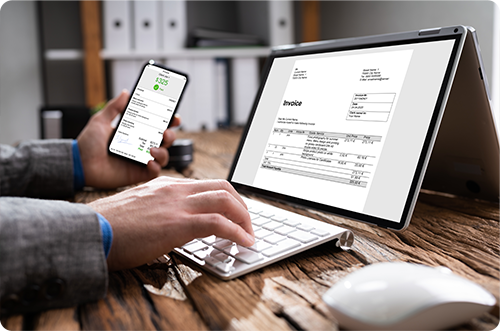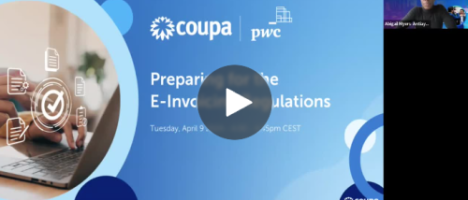E-Invoicing excellence
AI-driven and globally tax-compliant invoicing
Navigate e-invoicing and tax hurdles with Coupa. Empowering businesses for financial resilience in today's uncertain economy.
7 steps to e-invoicing
Transforming your invoice process into a digitized workflow involves key steps to enhance efficiency, accuracy and operational excellence. Here's a process breakdown and how our platform can help:
Data capture
The first step in digitizing invoice creation is to capture relevant data accurately. Instead of manual data entry, our AI-driven platform captures the data at the very beginning: from the purchase order or sourcing entry.

Invoice generation
Once the necessary data is extracted, the system automatically facilitates the creation of electronic invoices.

Touchless invoice billing
Matched invoices are automatically paid and billed to the right expense accounts using cloud invoicing to help you significantly reduce your cost-per-invoice.

AI-driven fraud detection
Powered by Coupa Community Intelligence, the platform leverages the latest artificial intelligence and machine learning techniques to detect errors and fraud automatically across all business spend, including cloud invoicing.

Finance system integration
Achieve true automation by integrating digital invoicing with financial and payments extensions. This enables real-time updates and synchronization of financial data across the entire company, reducing the risk of discrepancies and boosting the use of your working capital.

Explore Coupa Pay
Keeping up with changing regulations can be tricky. The Coupa platform automatically validates country-specific requirements before issuing an invoice to meet the rapidly growing number of B2B clearance models. You can rest assured: Digital invoices comply with legal and industry standards.

Analytics and reporting
Leverage the power of data analytics to gain insights into your invoicing process. Coupa allows you to enhance your process and track key metrics. Our Community.ai helps you to identify trends, make informed decisions and gives prescriptive advice to optimize your business.

Ensure B2B tax compliance
It's tough to keep up with rapidly changing indirect tax rules (VAT, GST, SST). Learn how the Coupa platform makes it simple to stay on top of all your tax obligations.
Invoice Information by Country
How invoices are issued and what information they must contain is regulated differently in each country. Coupa's invoicing solution always has the current rules implemented. The regulations of more than 50 countries around the globe are currently supported.
B2B Invoice Mandate Support
Coupa's invoicing solution not only supports country-specific invoice content but also supports the applicable process requirements in regions within scope that have clearance/CTC models.
Digital Signatures
Keep auditors happy with a digital signature: with digital signatures, you can prove the origin of your invoices and confirm that the information is correct and no one has changed them.
Validated Supplier Invoices
With Coupa Compliant Invoicing, validation is built into the backend, giving you assurance that tax rates and fields align with the country requirements.
Third-Party Review
Coupa has reached out to PricewaterhouseCoopers to review and test for international invoice compliance (VAT and GST)* in live environments. And that means that buyers and suppliers can be sure that country-specific requirements for electronic invoices are met.
Compliant Archiving
Coupa securely archives all your P2P documents — such as invoices, POs (purchase orders) and requisitions — to ensure compliance with global tax and accounting regulations for document storage and retrieval.
Tax and compliance requirements by country
Belgium
Legislation introducing mandatory B2B E-Invoicing has been approved, some key elements of this law include:
Implementation of mandatory B2B e-invoicing from 1 January 2026;
All VAT-registered taxpayers with permanent establishment are in scope, except those who apply the flat-rate regime, engage in VAT-exempt transactions or are bankrupt;
Non-resident taxpayers registered in Belgium for VAT and who have a permanent establishment (PE) in Belgium are in scope; and
An obligation to have the ability to use and transmit e-invoices via Peppol network;
France
On December 29, 2023, French authorities unveiled the legislation for the 2024 budget, introducing revised timelines for the e-invoicing and e-reporting mandate. According to the legislation, significant milestones for the e-invoicing obligation are set as follows:
- September 1, 2026: Mandatory reception of e-invoices for all taxpayers begins, with large enterprises (GE) and intermediate-sized enterprises (ETI) required to issue B2B e-invoices.
- September 1, 2027: B2B e-invoicing becomes compulsory for mid-sized (PME) and micro companies (TPE) in terms of issuance.
Notably, these dates are subject to potential postponement by the government for up to three months via decree, possibly shifting to December 1, 2026, and 2027, respectively. Additionally, France, having received a derogation from the VAT Directive until December 31, 2026, must reapply for an extension of this derogation.
The Directorate General of Public Finance (DGFiP) has published a list of candidate operators (PDP) applying to become Partner Dematerialization Platforms ahead of the French CTC mandate. It's important to note that inclusion in this list does not guarantee approval as a PDP, as rigorous evaluation is yet to be undertaken.
Furthermore, DGFiP recently organized a meeting to elucidate the timeline leading up to the CTC mandate implementation. They emphasized their commitment to meeting the new deadline (September 2026) and provided the following guidance:
- Q2 2024: Anticipated publication of new technical specifications and a decree, streamlining the process for service providers to attain PDP status.
- Q3 2024: First PDP certifications expected to be issued.
- Q4 2024: Launch of a restricted pilot program with limited participants, focusing on testing the PPF directory and core functionalities.
- 2025: Larger-scale pilot program involving numerous participants.
In addition to these updates, DGFiP addressed the interoperability between PDPs and the training of chartered accountants in preparation for the forthcoming mandate, underscoring a concerted effort toward smooth implementation and compliance.
Germany
Germany approved their version of an e-invoicing mandate, which will be rolled out in a phased approach from 1 Jan 2025 and applies to B2B transactions amongst German taxpayers. This mandate is different from mandates seen in other regions where the taxpayers are mandated both to issue invoices in a specified structured electronic format as well as to use specified means for exchanging these e-invoices (for e.g. National platforms like in Italy and Poland or private platforms like in France). Germany instead first requires taxpayers to have the ability to receive invoices in an electronic format and lays down the criterion that these electronic invoices must comply with the European standard for e-invoicing (EU standard EN 16931) and the list of corresponding syntaxes in accordance with Directive 2014/55/EU of April 16, 2014. Within this change, Germany has indicated that invoices in unstructured format (i.e., PDFs) will continue to be authorized until the buyer consents to this in 2027. Also noteworthy is that Germany does not mandate a specific means for exchanging these e-invoices and instead is allowing German companies to choose their preferred method for transmitting invoices.
Poland
Following the press conference on April 26, 2024, by Poland's Ministry of Finance, the National e-Invoice System (KSeF) implementation will proceed in two phases:
February 1, 2026: Obligation begins for companies with a turnover exceeding PLN 200 million (approx. EUR 46 million) in 2025.
April 1, 2026: Implementation extends to all other businesses.
The postponement was due to technical concerns revealed in a recent audit, necessitating the development of a new system architecture.
Saudi Arabia
The Kingdom of Saudi Arabia (KSA) rolled out e-invoicing in two phases. Phase 2 was implemented in waves beginning on 1 January, 2023 and requires e-invoicing generation systems (EGSs) to integrate with Zakat, Tax and Customs Authority (ZATCA) and issue e-invoices in specific formats.
Coupa supports Saudi Arabia in its CaaS Invoicing offering through Issuance & Clearance of compliant tax invoices on behalf of suppliers with the ZATCA portal. Compliant tax invoices (in XML format) and human-readable PDF/A-3 form of the invoice (bilingual - Arabic and English) are available to suppliers and customers for their invoicing transactions. In 2022 ZATCA announced the "Cancellation of Fines and Exemption of Penalties initiative" for taxpayers who are subject to all tax systems and ending on 31 May 2023. This has been extended on a number of occasions with the current end date 30 June 2024.
UAE
The UAE Ministry of Finance has revealed the first insights into the upcoming CTC e-invoicing mandate. The intended initial scope of the mandate will include B2B and B2G transactions, with plans to explore B2C transactions in the future. The UAE will potentially adopt a 5-corner model , with expectations they will leverage PEPPOL specifications. Dates to remember:
Q3 2024: Development of the service provider's certification requirements and procedures, along with the UAE Data Dictionary.
Q2 2025: Introduction of eInvoicing legislation.
December 2025: Rollout strategy.
July 2026: Phase 1 go-live for Reporting.
Malaysia
Malaysia announces the implementation of electronic invoicing in phases to strengthen the efficiency of the government’s tax system and help grow the digital economy. The model to be implemented will be a continuous transaction controls (CTC) model with the tax authority - Lembaga Hasil Dalam Negeri Malaysia - (LHDNM), clearing the invoice.
The gradual implementation of mandatory e-invoicing has been scheduled as follows:
- August 1, 2024: Taxpayers with an annual turnover or revenue of more than RM100 million
- January 1, 2025: Taxpayers with an annual turnover or revenue of more than RM50 million and up to RM25 million
- July 1, 2025: All remaining taxpayers
Resources for smarter e-invoicing
Browse our resources to help you start your e-invoicing journey.
Demonstrable Compliance*
Coupa is an invoicing compliance solution that has been subject to a PricewaterhouseCoopers review and tests in live environment so as to allow Coupa helping buyers and suppliers to comply with country specific e-invoice regulations*.
* In collaboration with PwC Business Advisory Services BV ("PwC" or “PricewaterhouseCoopers”), Coupa Software Incorporated (“Coupa”) has studied the tax and legal framework for its e-invoicing and e-archiving solutions in various countries (as determined in the engagement letter). Within the framework of this collaboration, PwC assisted Coupa in mapping relevant tax and legal e-invoicing and e-archiving requirements, and in carrying out a review (based on its written solution description) and, where appropriate, a walk-through of the solution in its live environment in order to validate the compliance of the VAT/GST e-invoicing and e-archiving aspects of Coupa Compliance as a Service (CaaS). Coupa also receives regulatory updates from PwC on changes in e-invoicing and e-reporting that could have an impact on the compliance of our solution.



 Today, nearly 90% of Saga's invoices run through Coupa. Invoicing and approvals are 100% paperless and fully digitized.
Today, nearly 90% of Saga's invoices run through Coupa. Invoicing and approvals are 100% paperless and fully digitized.



